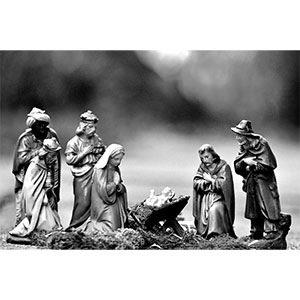You’ll know us when you see us. We’re pretty easy to spot. We’re usually the ones walking around with a look of bewilderment on our faces, reeling from the impact of the day’s most recent class discussion. Teetering on the edge between enthusiasm (“education is a gift!”) and panic (“I’m in over my head”), we are actively addressing topics that force us to answer the question, “What do I believe?” We walk in the doors at the beginning of the semester with one set of ideas, and quickly become exposed to a variety of perspectives that challenge us to think critically and stretch us in ways that we may or may not have been prepared for when we arrived. In those early days, the more we learn and develop our understanding of theology, the answer to: “What do I believe?” becomes, “I thought I knew…now, I’m not so sure.”
What I appreciate about GRTS, however, is how naturally this process seems to take place. The benefit of attending a multi-denominational seminary is the exposure to a variety of theological perspectives from both students and faculty. Hearing from students and professors from different backgrounds gives us the opportunity to have active class discussions and share ideas, in a respectful, academic environment.
A particularly memorable exchange between a student and a professor occurred in my Theology for Counseling class. The professor briefly touched on the idea that Christ is currently a man. A classmate had never heard this before and raised her hand…
Classmate: “Can you go back to what you just said for a second? Did you just say that Christ is a man, now … in heaven?”
Professor: “Yes.”
Classmate: “So sitting at the right hand of God, Christ has a body?”
Professor: “Yes.”
Classmate: “I have never heard that before.”
She was truly mystified. I admired her honesty, because I know I have personally experienced this feeling. I believe that first-year seminary students experience this moment at least once, if not frequently, over the course of the semester: the moment their mind is blown. The moment they encounter “game-changing” theology. It can be eye opening and revelatory or unnerving and unsettling, but we’ve all been there.
For me this came in the form of re-evaluating my understanding of the Creation, Fall and Redemption narrative. I had a good understanding of my redemption in Christ and that I have eternal life. But, like many, I had an idea of pearly gates, streets of gold and an eternity of milk and honey in heaven. You can imagine the mind-blowing shift that occurred when I began to study New Creation theology.
If you talk with current students and alumni, this process seems to be a rite of passage. As I studied specific topics this semester, I would talk with friends who recalled their own similar experiences. It makes me feel less naive, and less like a first-year “newbie” to know that there are those who have gone before me who have wrestled with these same topics and have arrived at a solid confession of faith. I have to admit that I do feel more confident in my faith than I did four months ago.
Seminary can be a truly transformational experience. I was curious what some of our students found particularly impactful during their first year at GRTS. I gathered some of their stories:
“I was surprised to find that seminary was a place for spiritual growth and maturation and not just a place for academics. The spiritual direction component of Sharon Brown’s Spiritual Formation Class was really impactful. It was like a life raft during a particularly difficult time in my life, more so than even church.”
“I found that just being a Christian didn’t entitle me to having right thoughts about God. Studying under professors who have devoted their life to studying one aspect of theology was really humbling. Getting these truths correct, academically, is just the beginning. Integrating them into life is even more challenging. Being a Christian takes work and study.”
“In my first semester, I was astonished as I began to understand how the historical background of a text could shape its meaning. As we were learning to interpret the Scriptures in our Biblical Hermeneutics course, we were also afforded the opportunity to reflect on how background issues could affect the intended meaning of the text. For example, I had never known or considered that the New Testament texts were likely read aloud, and intended to be read aloud, to entire churches. The individual members of the churches likely had no opportunity (or ability) to read the texts in an individual setting! This simple fact opened my imagination to how the texts were originally received, and therefore affords me a greater chance to come closer to what the authors of the NT intended to say when they wrote.”
“I was surprised by how little I knew. I knew nothing. And yet people were still coming to Christ. God is gracious.”
I approached a group of students on break during their Biblical Hermeneutics class and asked them what was particularly surprising this semester. Two students said in unison, “THE SERPENT!” One student elaborated, “After a lecture on ‘The Garden,’ I called my husband and said, ‘Did you know about this?!'”
What impacted you during your first year at seminary?







